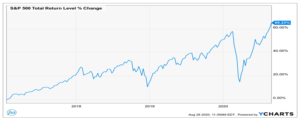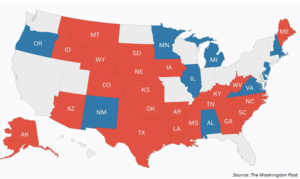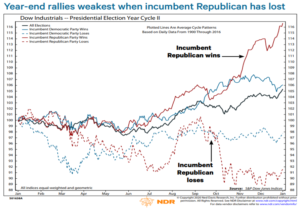Given everything that has already happened in 2020, it may seem as though the market has all but forgotten about another major event looming on the horizon: the 2020 US election. Yet in less than two short months, American voters will go to the polls on November 3 to determine who will control both the White House and Congress. In this market update, I will dive into possible election outcomes and their potential impacts on the markets, as well as historical market performance surrounding prior US presidential elections.
With the major party conventions now behind us, we have established that incumbent President Donald Trump is the Republican Party’s nominee and former Vice President Joseph Biden Jr. is the Democratic Party’s nominee. In addition to the presidency, there are 35 Senate seats up for election, as well as all 435 seats in the House of Representatives.
President Trump’s Secretary of the Treasury Steve Mnuchin said in an interview with CNBC in early 2017 that “we absolutely view the stock market as a report card.” Given that President Trump himself has frequently referenced the gains made in the stock market during his tenure, we can safely assume that market-friendly policies will continue to be pursued if he is reelected for a second term. The chart below shows the cumulative gain of approximately 65% in the S&P 500 during Mr. Trump’s first term through the end of August of this year:
However, even if President Trump does secure a second term, that does not necessarily mean that the stock market must cooperate. As an example of this, one must look no further than former Republican President George W. Bush whose second term saw the stock market fall 26% despite his administration’s business-friendly policies.
A Biden Presidency
The former Vice President has made no secret of his intent to raise taxes on top earners as well as reversing portions of the corporate tax cuts passed in the Tax Cuts and Jobs Act of 2017, according to the candidate’s website. A reversal back to higher corporate tax rates is a key policy change that investors will be on the lookout for if Mr. Biden wins the presidency as it carries the potential to have the most immediate impact on stock prices.
However, Mr. Biden is unlikely to achieve his tax policy changes without a simultaneous Democratic takeover of the Senate and a hold on the House of Representatives, also known as a “Democratic sweep.” This outcome is certainly a possibility as the Senate map is particularly challenging to Republicans this cycle, with the GOP defending 23 seats to the Democrats’ 12. The Democrats would need a net gain of just 3 seats to control the Senate, so long as Mr. Biden also wins the Presidency (this is because the Vice President acts as a tiebreaker vote in the Senate). In order to control the Senate without also securing the White House, the Democrats would need a net gain of 4 seats. The map below illustrates the 2020 Senate elections with red corresponding to a Republican seat up for election and Blue for a Democratic seat.
What History Can Tell Us
History has not been kind to any president whose first terms have experienced recessions at election time. Those incumbents lost their reelection bids 80% of the time, according to Ned Davis Research. While the US economy is well on its way to recovering from the COVID-19 recession, whether a majority of Americans actually feel as though the recession is over is another question altogether. Ned Davis goes on to point out that, “Since 1952, no party has retained the White House when there was either a 20% market decline or a recession in an election year. Both have taken place in 2020.” Certainly, the evidence suggests that President Trump is fighting an uphill battle given the macroeconomic backdrop.
However, Mr. Trump surprised the world in 2016 and is a possibility again in 2020. Looking to historical election year market performance in the chart below, win or lose, the largest market moves come when it’s a Republican president who is up for reelection. However, 2020 has already shattered all sorts of market expectations, so any outcome that is different from traditional norms would not be surprising.
The FSA Safety Nets® Stand Ready
If President Trump loses the White House to former Vice President Biden, it will be the first time since 1992 in which an incumbent president loses reelection. There is an entire generation of investors who have no prior experience navigating markets during an incumbent’s defeat, potentially creating a scenario in which market volatility would return.
Regardless of how the election shakes out and how the markets choose to react, we will be monitoring market trends closely. If the stock market does choose to sell off, we will follow our exit process by moving money to the shore to avoid the choppy waters. If, however, the market decides to rally into the end of the year, we stand ready to benefit from that as well.
Derek Kravitz
Investment Analyst
Disclosures are available at https://fsainvest.com/disclosures/market-update/.
FSA’s current written Disclosure Brochure and Privacy Notice discussing our current advisory services and fees is also available at https://fsainvest.com/disclosures/ or by calling 301-949-7300.







